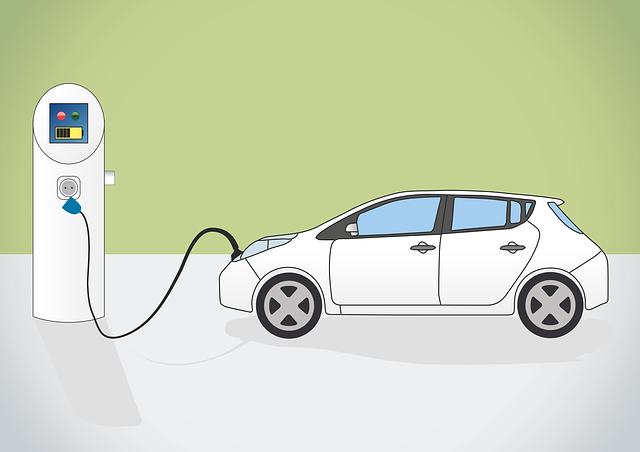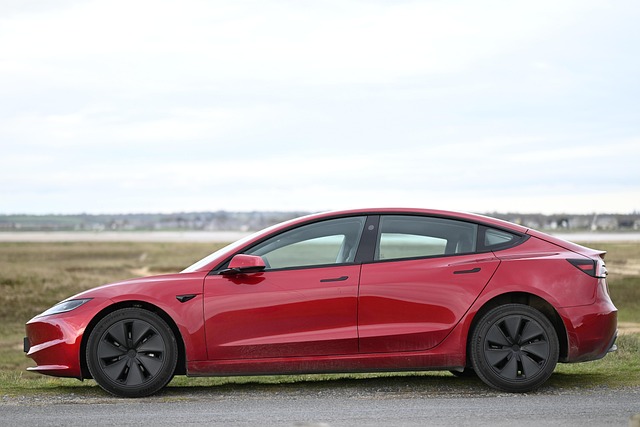EV battery care is essential for optimal performance and longevity of Select Electric Vehicles. Regular maintenance, avoiding extreme temps, and using green charging methods extend battery life. Avoid deep discharge, charge moderately, and choose models with advanced thermal management systems. Proper range management, routing apps, and pre-conditioning enhance EV efficiency in urban areas. Monitor vehicle health through diagnostics and consider leasing while waiting for improved technology.
Looking to maximize the lifespan and performance of your electric vehicle’s (EV) battery? This comprehensive guide breaks down everything you need to know about EV battery care. From understanding the fundamentals of lithium-ion technology to practical tips on charging, maintenance, and range management, we cover it all. Learn about common causes of battery degradation and when to consider replacement. Discover expert strategies for efficient range planning with Select Electric Vehicles.
- Understanding EV Battery Basics
- Charging Practices for Optimal Lifespan
- Maintaining Battery Health Tips
- Common Causes of Battery Degradation
- Efficient Range Management Strategies
- When to Consider Battery Replacement
Understanding EV Battery Basics

Understanding EV Battery Basics
When you opt for a Select Electric Vehicle (EV), you’re investing in cutting-edge technology that offers numerous benefits, including reduced environmental impact and lower running costs. At the heart of every EV lies its battery pack—a complex system designed to store energy efficiently and power the electric motor. These batteries are distinct from their internal combustion engine counterparts, requiring specialized care for optimal performance and longevity. Regular maintenance, such as keeping them charged within a specific range and avoiding extreme temperatures, significantly extends their lifespan.
By understanding the unique needs of EV batteries, you can ensure that your vehicle maintains its powerful performance, especially in electric cars with excellent range and affordable electric SUVs suitable for families. Furthermore, staying informed about best practices enables you to take advantage of nearby electric vehicle charging stations, ensuring convenient and efficient recharging during your daily commutes or road trips.
Charging Practices for Optimal Lifespan

Charging your EV is a crucial part of ownership, and adopting good practices can significantly extend its battery lifespan. When it comes to charging, consistency is key. Aim to charge your vehicle regularly, preferably daily or at least several times a week. This helps maintain an optimal battery level, preventing deep discharge cycles that can degrade the battery faster.
Select Electric Vehicles offer various charging options, from home charging stations to fast-charging networks. Utilizing green energy logistics and shipping options for charging, where available, is not only environmentally friendly but also beneficial for your vehicle’s health. For families considering affordable electric SUVs, understanding these practices ensures a smoother transition to eco-friendly transportation while keeping your vehicle in top condition for years to come.
Maintaining Battery Health Tips

Maintaining the health of your electric vehicle (EV) battery is paramount for optimal performance and longevity. One effective strategy is to avoid letting the battery drain completely. Most modern EVs have smart management systems that prevent deep discharge, but it’s still beneficial to be mindful of your driving habits. Regularly charging your EV at moderate rates rather than relying on fast chargers whenever possible can help preserve battery health. Additionally, keeping your vehicle in a temperature-controlled environment, avoiding extreme heat and cold, will protect the battery from thermal stress.
When selecting an Electric Vehicle, consider models designed with advanced battery care features, such as those offering efficient charging speeds and integrated thermal management systems. For businesses operating sustainable commercial vehicle rentals or seeking environmentally friendly transportation solutions, choosing EVs with robust battery longevity in mind can significantly reduce maintenance costs and minimize the environmental impact associated with heavy-duty truck alternatives.
Common Causes of Battery Degradation

Battery degradation is a common issue affecting many types of electric vehicles (EVs), including long range electric buses for public transport, affordable electric SUVs for families, and e-biking as an eco-friendly alternative. Several factors contribute to this deterioration, with some of the most prevalent causes being excessive heat exposure, full discharge cycles, and overcharging.
Heat is a significant culprit, as high temperatures accelerate chemical reactions within the battery, leading to reduced capacity and lifespan. Regularly parking EVs in hot environments or during intense summer months can exacerbate this issue. Moreover, allowing the battery to fully discharge frequently can cause damage, especially when combined with rapid charging cycles. Lastly, overcharging, whether intentional or due to incorrect charger use, can lead to internal damage and significantly impact overall battery health.
Efficient Range Management Strategies

Managing your Electric Vehicle (EV)’s range effectively is key to enhancing your driving experience and ensuring a smooth transition to zero-emission transportation choices, especially for urban commuting. One efficient strategy involves planning your routes in advance, taking into account charging stations along the way. This proactive approach allows drivers to optimize their trips, making sure they’re always within their EV’s range. By utilizing apps that provide real-time data on charging infrastructure, you can make informed decisions and avoid unexpected range anxiety.
Moreover, maintaining a balanced charge is crucial, particularly for best electric vehicles for winter driving. Keeping your battery between 20% and 80% capacity helps preserve its long-term health and performance. When planning longer journeys or facing colder climates, consider pre-conditioning your vehicle—warming it up before you drive to maximize range. These strategies not only ensure efficient range management but also contribute to the overall sustainability of your EV ownership experience.
When to Consider Battery Replacement

The lifespan of an EV battery is a key consideration for Select Electric Vehicle owners. While modern lithium-ion batteries are designed to withstand years of use, their performance degrades over time. Several factors influence this degradation, including temperature extremes, frequent rapid charging, and deep discharge cycles. If you notice a significant drop in your vehicle’s range or charging speed, it might be an indication that battery replacement is necessary. Regularly monitoring your EV’s health through on-board diagnostics can help predict when to consider this upgrade, ensuring you stay on the road with optimal performance.
For those looking for sustainable zero-emission transportation choices, leasing affordable electric car options can provide a cost-effective solution while waiting for technology advancements. The best long range electric cars are constantly evolving, offering drivers more freedom and flexibility without compromising environmental benefits.
In the ever-evolving landscape of electric vehicles (EVs), proper battery care is essential for maximizing range, longevity, and overall performance. By understanding the fundamentals of EV batteries, adopting best practices for charging and maintenance, and being aware of common degradation factors, drivers can efficiently navigate their journey with select electric vehicles. Implementing these strategies not only enhances daily driving experience but also contributes to the sustainable future of clean energy mobility.
